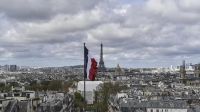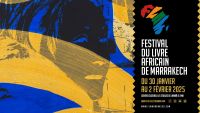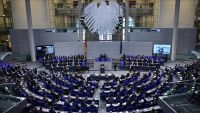Sarkozy says immigration will be the subject of 'extremely deep debate'.
He says people can conceal themselves within their community
Former French President joined world leaders for Paris march yesterday
Former French President Nicolas Sarkozy has said immigration 'complicates things' in the wake of the terrorist attacks in Paris.
Mr Sarkozy, 59, was speaking after he joined leaders from across the world - and linked arms with political rival Francois Hollande - during yesterday's march in Paris in a defiant show of unity.
Mr Sarkozy, who was the first French president not to be re-elected for a second time since 1981, said: 'The question of immigration will be the subject of an extremely deep debate because we cannot continue like this.
'Immigration, which we have such problems coping with, creates the problem of integration, which creates communitarianism, where people identify with their own community.
'And people like those who carried out the attacks which killed 17 people last week can conceal themselves within this communitarianism.'
Mr Sarkozy, the son of a Hungarian immigrant and a French mother of Greek-Jewish origin, has long taken a hard stance against immigration.
As interior minister he notoriously talked of hosing down troubled housing estates, describing young delinquents in the Paris suburbs as racaille, or rabble.
Later as president he pushed through measures to curb illegal immigration - including the highly controversial mass deportation of Roma Gypsies.
His comments came as the French government admitted 'we are at war' and prepared to hold an anti-terrorism crisis meeting today.
French Prime Minister Manuel Valls said there would be a clampdown on 'home grown' killers.
'We are involved in a war against terrorism, against radical Islam, against Jihadism,' Mr Valls said, as he pledged new measures to fight the growing menace.
Mr Valls admitted to 'clear failings in the system' which saw surveillance on three Paris-born killers dropped six months ago because they were considered 'low priority'.
The violence in Paris began on Wednesday when Cherif and Said Kouachi, both heavily armed, attacked the offices of Charlie Hebdo magazine.
The brothers then went on the run, before becoming surrounded by police at a warehouse in Dammartin-en-Goele, 35km (22 miles) north of Paris, on Friday. They were eventually killed after exchanging fire with police.
On the same day, another gunman Amedy Coulibaly, took several hostages at a kosher supermarket in eastern Paris on Friday.
Four hostages died - Yoav Hattab, Philippe Braham, Yohan Cohen, and Francois-Michel Saada.
Coulibaly is also believed to be behind the killing of a policewoman in southern Paris on Thursday.
His widow Hayat Boumeddiene - who fled to Syria from Turkey today - is now the most wanted person in France.
It is believed Boumeddiene evaded capture in Istanbul because French intelligence services did not share details of her identity with their Turkish counterparts.
A source told MailOnline: 'She just slipped through the net. It is that simple. It should not have happened.
'She should have been on the radar of French intelligence, and they should have told their contacts about her movements – but they failed to do that.
'If the security services had done their job properly, they would never have let her leave the country.
'But once she left France and arrived in Turkey, she had the opportunity to go anywhere. It is unbelievable she has got away so easily.'
It was also revealed that the Kouachi brothers were on UK and US terror watch lists and Coulibaly was convicted for plotting to free a known militant from prison.
He met Cherif Kouachi while in jail, and the three soon formed into a terrorist cell which was able to get hold of automatic rifles and other weapons with relative ease.
Despite their criminal convictions and clear links to IS and other terrorist groups such as Al-Qaeda, they were given free rein to strike.
Michel Thooris, a Police trade union leader, said: 'Somewhere along the line the suspects fell through the cracks.
'Either the judicial system did not sentence them strongly enough, or there was a failure in police surveillance. This was a military strike against civilians by individuals at war, in a country at peace.'
Security services on both sides of the Channel have warned further attacks are 'highly likely' and Prime Minister David Cameron is consulting senior intelligence officials in Downing Street.
![]()









